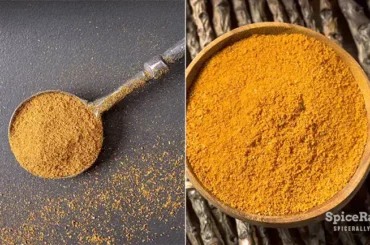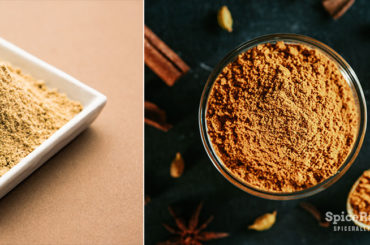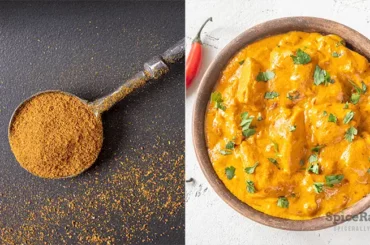Pronounced as Ber-buh-reh, this spice mix is integral to Ethiopian and Eritrean cuisines. It is jam-packed with flavors and versatility to be used as an ingredient or a condiment. So, we are here to bring you the facts about Berbere spice ingredients.
The content of this spice blend could have slight variations depending on the brand you buy or the recipe you are trying at home. However, the key ingredients usually include spices such as:
- Coriander seeds
- Cumin seeds
- Allspice
- Black Peppercorns
- Cloves
- Nutmeg
- Cinnamon
- Fenugreek
- Cardamom
- Ginger
- Turmeric
- Red chili powder
In addition to these spices, some recipes may sometimes include salt, paprika, and some exotic spices like korarima, nigella seeds, and ajwain.
So, we hope to embark on everything regarding berbere spice ingredients, the uses of this mix, and many more. Keep reading until the end!
What Is Berbere Spice Made Of?
Berbere is basically a blend of commonly used, sometimes lesser-known spices, and some recipes even include salt. Plus, this is often used as a ubiquitous flavor enhancer, serving as a cooking ingredient and also as a condiment.

What Spices Are Used In Berbere Spice Mix?
As mentioned before, the content of this blend could have slight variation depending on the recipe. But there is a set of staple spices that can be savored in almost all the recipes.
01- Coriander Seeds
The gentle citrusy, floral, and slightly sweet coriander seeds give this mix a unique earthy flavor. And it is not as intense as other spices usually used in Berbere. Ground coriander seeds impart a more robust taste than the whole seeds. This spice pairs well with cinnamon, cloves, cumin, and nutmeg used in this.
02- Cumin Seeds
Cumin seeds are also added to this blend, like coriander seeds by grinding. It essentially gets along well with other ingredients like cardamom, cinnamon, cloves, and coriander. Cumin is warm, earthy, and has a slight bitter-sweet flavor. This spice compliments meat dishes really well, especially when the blend is used as a dry rub.
03- Allspice
Ground allspice is another signature taste in the mix. It is earthy, bitter, and has a flavor combination of cinnamon, nutmeg, and cloves, so a bit of amount would go a long way in the mix. The flavor profile of allspice is excellent on savory dishes, and it matches well with chili powder, cloves, nutmeg, coriander seeds, and cinnamon.
04- Black Peppercorns
Whole black peppercorns are used in the mix by grinding with other whole spices. The woody, earthy, piney and peppery hints of black pepper make berbere more pungent and great for many meat-based dishes. This versatile spice gets along well with almost every ingredient used in the mix.
05- Cloves
Cloves have a sharp, astringent flavor with slightly sweet and bitter notes. And, this is a rich spice that could add a lot of profundity to this spice blend. In fact, cloves are very aromatic and pair well with other slightly sweet spices like cinnamon, allspice, nutmeg, and coriander seeds.
06- Nutmeg
Nutmeg is also an aromatic spice with nutty, slightly sweet, warm, and woody flavor elements. Freshly grated or ground nutmeg is used in the mix, and it complements many dishes that call for an extra kick. Generally, this spice makes good teams with cinnamon, cardamom, cloves, coriander seeds, and cumin.
07- Cinnamon
Ubiquitous cinnamon gives berbere a distinctive taste with its earthy, slightly spicy-sweet, and woody flavor profile. The cinnamon infusion gives an incredible punch, whether spice blend is called for an ingredient or a condiment in a recipe. This spice goes particularly well with cumin, coriander seeds, cloves, and nutmeg.
08- Fenugreek
The taste of fenugreek can be somewhat exotic to Western cuisine, but it is often used in many spice mixtures. Fenugreek seeds have a strong maple hint with nutty and sweet flavor notes. When eaten raw, it cannot be very pleasant. But it will give Berbere a subtle taste when ground and mixed with other strong spices. Fenugreek seeds pair pleasingly with coriander seeds and cumin and complement many stews and lentil dishes.
09- Cardamom
Ground green cardamom is one of the main Berbere spice ingredients that is hardly skipped by any recipe. This spice has a unique and intricate flavor profile with minty, eucalyptus-like hints and a slightly sweet and citrusy kick. It goes well with cooked dishes like meat and gets along with other spices like cinnamon, cloves, coriander seeds, and cumin.
10- Ginger
Dry ginger powder is an omnipresent ingredient in this spice blend with the utmost versatility to pair with any other spice. It is pungent and has floral notes with slightly sweet and peppery hints. Ginger is ideal with any cooked dish or a recipe that calls for Berbere as a condiment.
11- Turmeric
Turmeric is the ultimate corant spice of this spice blend. With its beautiful yellowish golden hue, turmeric also carries a depth of flavor. It has an overpowering earthy element with a musky and slightly peppery note. Turmeric is very fragrant, and due to its strong flavor and aroma profiles, only a little is used in the mix.
The addition of this spice is great with many cooked dishes like lentils, soups, stews, and meat. Moreover, turmeric has the ability to pair with most ingredients used in this blend.
12- Red Chili Powder
The usage of red chili powder in Berbere is an utterly customizable matter. The reason is the type of red chili powder could vary depending on the recipe. However, any variety of hot red chili powder is used in this mix in order to get a spicy, hot, and fiery punch.
The authentic Berbere recipe is known to have used Ethiopian brown chili peppers. But, it can also be either Mexican red chili powder, Kashmiri red chili powder, cayenne pepper, chili powder, hot paprika, etc. Nevertheless, although the level of spiciness could have slight differences, any chili powder could give Berbere a deep, rich flavor and a color.
What Are The Other Berbere Spice Ingredients?
Apart from these spices, this blend could also include some other ingredients such as:
- Salt
- Korarima
- Long pepper
- Nigella seeds
- Ajwain
- Rue
What Does Berbere Spice Taste Like?
Most Berbere spice ingredients are warm, pungent, and not so mild. Therefore, you cannot expect this spice blend to be very temperate. It imparts a strong, warm, and spicy taste with a subtle flavor profile.
In fact, it has an intricate, rich, and profound flavor profile thanks to the combination of elements of its many ingredients.
How Do You Use Berbere Spice Mix?
As mentioned on top, this blend comes with the adaptability to be used both ways in cooking as an ingredient and a condiment. Accordingly, it complements many recipes that call for a rich taste and a deep zest.
So, here are some versatile ways that you could use Berbere:
- In stews ( this is a staple in “Doro Wat”- a famous stew dish in Ethiopia)
- As a dry rub for grilling and roasting meat, fish, and seafood
- As an addition to dipping sauces
- In braises
- Used for an extra punch in vegetable, lentil, and legume dishes
- It can be sprinkled into the cheese sauce, pasta sauce, and barbeque sauce
In Ethiopia, food is often looked at through a strong spiritual lens, stronger than anywhere else I know. It’s the focal point of weddings, births, and funerals and is a daily ceremony from the preparation of the meal and the washing of hands to the sharing of meals
Marcus Samuelsson
What Pepper Is Used In Berbere?
The traditional Berbere recipe consists of black pepper and Ethiopian brown chili peppers. However, although the usage of black pepper remained a staple, chilies tend to change with the evolution of the recipe.
This mix nevertheless calls for hot chilies. Consequently, most Berbere recipes now include types of chilies like:
- Paprika
- Cayenne pepper
- Kashmiri red chilies
- Mexican red chilies
- Bird’s eye chiles
Is Berbere The Same As Peri Peri?
Berbere and peri-peri are not the same. Peri-peri is actually a type of single chili, also known as African bird’s eye chilies. While on the contrary, Berbere is a combination of pungent and flavorful spices.
In addition, peri-peri is a lot spicier and hotter than Berbere. It marks a range from 50,000 to 175,000 on the Scoville scale (spiciness or “heat” scale), which is “very hot,” according to our senses. However, the hotness of Berbere is not compared to anywhere near peri-peri.
Use Berbere For An Extra Kick To Your Dishes!
Zesty Berbere spice ingredients make it a unique blend undoubtedly. The staple spices like coriander seeds, cumin seeds, cinnamon, black peppercorns, cloves, nutmeg, fenugreek, turmeric, red chilies, cardamom, ginger, and allspice get together and make the most epic blend to be added in a lot of recipes.
So how do you plan to use Berbere next time? As an ingredient or as a condiment in your dipping sauce? We would love to know with a comment down below!




